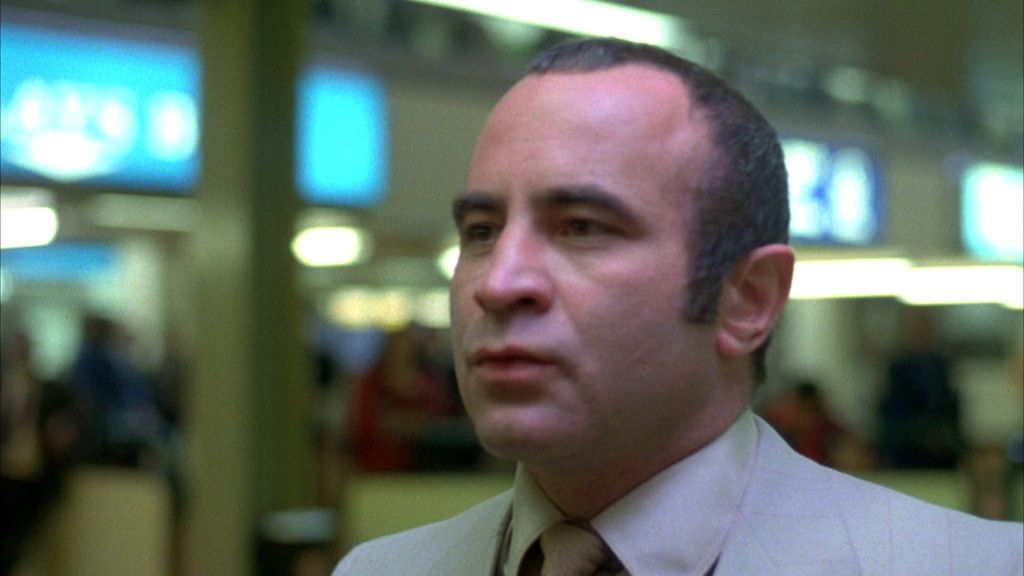From police procedurals to heists, American film noir and French policiers via South Korean serial killers, Criminal Record is a new column on Flip Screen, delving into the rich and heady cinematic history of crime films. First up, an Easter-themed look at The Long Good Friday.
“You don’t crucify people! Not on Good Friday!”
Four decades since its release, what jumps out most in The Long Good Friday is how completely the London envisioned by protagonist Harold Shand (Bob Hoskins) has come to fruition. As he surveys the crowd on his yacht and describes how he plans to turn the East-End docklands into a gleaming, slick, ultra-modern financial centre, it’s remarkable just how much the Shand’s of this world have taken over. The principal difference is that today they mostly rob with a fountain pen instead of a gun.
Though this unfortunate reality ensures The Long Good Friday’s enduring relevance, there’s far more to the film. The plot is simple: a gangster (Shand) attempts to broker a real estate deal that will transforms the dilapidated Thames docklands, but finds his world upturned over one Easter weekend by mysterious malicious elements killing off his organisation. The story provides a simple connecting thread with which to capture a London about to transform in the Thatcherite era, alongside all the uniquely British hang-ups around class and aspiration that come with that transformation. The film packs an even tougher historical punch once it’s revealed who the mysterious malicious elements are – the IRA.
Director John Mackenzie and screenwriter Barrie Keefe were no doubt aware of the context in which they made the film, attentive to the way Britain was changing at the time. The doldrums of ‘70s were giving way to the greed and desperation of the ‘80s; Shand may be a Thatcherite to the core, but it’s worthwhile remembering that the script was ready by the time she came to power in May 1979.
Shand sees himself as the quintessential Briton, Englishman and Londoner: deeply working-class but hard-working and tough, pulling himself up to the top through sheer force of will. He’s desperate to carry on the buccaneering legacy of Empire. “I’m a businessman with a sense of history, and I’m also a Londoner.”, he remarks during his famous speech near the start of the film, flanked by Tower Bridge in the background, drenched in symbols of wealth, power and Empire. He’s the last man standing of the ’60s London underworld personified by the Krays. As he’s about to go legit, he boasts of how he has negotiated ten years of peace amongst London’s organised criminals (Keefe worked as a reporter in the ‘60s, covering much of the seedy beat that the Krays ruled, and it shows in the film’s wonderful use of language).
The irony of course, is that Shand doesn’t have a sense of history. When he realises that it’s the IRA who are after him – the result of a deal gone wrong whilst in the US – he insists on fighting them man-to-man. His actions link his aspirational, profiteering psyche with the ill-gotten gains of Britain’s Empire, by choosing to ignore the IRA’s history as a political group that arose exactly as a response to the bullishness and greed exhibited by Shand and his predecessors. When his search for the culprits takes him to multicultural Brixton, he looks down his nose at its denizens, his racism through to the front. And when he declares his love for the Common Market in the EU, and that England is “not an island, but a leading European state”, it’s because of the profit potential he sees in it, not the people and exploitation on which that profit will be built.
The London docklands, where much of the film takes place, is filmed in a grotty, flat manner. There are few moments where the film gives into the temptation to dig into noir-ish, expressionistic lighting. Visually, the film constantly plays on the dereliction of the area around us, and the gaudy glamour of Harold Shand’s lifestyle; the yacht moored in the docks (a super yacht by the standards of the day); the lovingly-restored favourite pub in the middle of a run-down area; the expensive car cruising incongruously through Brixton.

Hoskins’ leading role has been thoroughly praised throughout the decades since release as a showboating bit of cockney gangsterism, but it’s full of deeper subtleties, such as Shand’s response to class – and it is around class and the imperial legacy that so much of the film’s subtextual richness is built. When he visits Brixton, there is that snobbishness and racism, but also a tinge of recognising his own working-class upbringing in these surroundings. He’s desperate to impress the two Americans, Charlie (Eddie Constantine) and Tony (Stephen Davies); the film plays up the height differences between the Brit and Yank actors, the latter imposing their power from atop, aggravating Shand’s built-in class grievances. Then there’s his relationship with Victoria (Helen Mirren). Mirren’s performance is equal to Hoskins, taking what was, in initial versions of the script, a one-dimensional gangster’s moll into a more complex, intellectual and influential figure. Here, Victoria’s upper-class background is a counterpoint. Where Shand provides the money and lifestyle, Victoria provides the decorum and tactful advice on moving through ever-higher corridors of power.
Though the film is aware of how class envelops so many aspects of the British psyche, it’s remarkable how few British crime films, including The Long Good Friday, have clearly drawn the link between political corruption, power, and wealth. Where American crime films quite regularly connect the highest corridors of power with mafia money, and Italian cinema does much the same, there always seems to be a bit of squeamishness in British cinema about connecting the two. Here we have councillor Harris (Bryan Marshall), a corrupt politician who serves in Shand’s pocket. But he’s simply a lowly councilman – and from what we see, quite an inept one given to drunkenness. As the film starts, Shand has plans confirmed to start redeveloping the Thames docklands he so dearly wants to transform. You don’t get that much political power just through one drunk councillor, do you?
That corruption connection is an interesting unanswered question through which to look at other British crime films, built so often on the influence of The Long Good Friday: cockney gangsters, gratuitous violence, ‘hard man’ actors like Ray Winstone and Jason Statham. Class has always dug deep into British cinema, and whilst the British crime film certainly existed before The Long Good Friday, few since have achieved its same level of toughness, complexity and entertainment.


Leave a comment